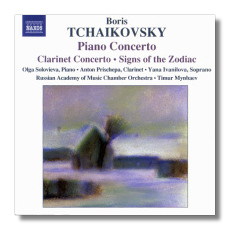
The Internet's Premier Classical Music Source
Related Links
- Latest Reviews
- More Reviews
-
By Composer
-
Collections
DVD & Blu-ray
Books
Concert Reviews
Articles/Interviews
Software
Audio
Search Amazon
Recommended Links
Site News
 CD Review
CD Review
Boris Tchaikovsky

- Piano Concerto *
- Clarinet Concerto **
- Signs of the Zodiac ***
* Olga Solovieva, piano
* Pavel Alfyorov, double-bass
** Anton Prischepa, clarinet
*** Yana Ivanilova, soprano
*** Olga Solovieva & Irina Goncharova, harpsichord
Russian Academy of Music Chamber Orchestra/Timur Minbaev
Naxos 8.557727
That's Boris Tchaikovsky in the headnote, not Pyotr. And, many will assert, there's a big difference. Who can quarrel with that? Yet, I'm not so sure Boris is far behind his namesake. The notes to this disc, by Louis Blois, go to some length to emphasize that rhythm is driving element throughout the five-movement Piano Concerto. Indeed. But minimalism also plays a part: the first movement, a toccata, is built upon an insistent, rapidly repeating eight note (G, just above middle C), which later evolves into chords, all hammered out in a seeming frenzy. It's quite exciting, but you won't recognize a conventional theme here, not that the music is difficult to grasp.
The second movement opens with a lovely solo on the double-bass, then later the music toughens its expressive character only to return to the gentleness of the opening. The restless third movement comes across as tense, neurotic, but without the over-the-top anxiety of the opening panel. The fourth movement edges closer to the recklessness of the first, but tempers its anxiety with a dreamy sense at times. The finale stumbles at first in its hesitant, almost stately character, but then ratchets up the tension, unable, however, to divest itself of the stop-and-start rhythmic manner heard in the opening pages.
The work is dark and uncompromising, finely crafted, though I find the writing for the horn less than convincing. The Clarinet Concerto is quite a gentle, lyrical work that offers contrast to its angry sibling. At first hearing it may be less dramatic and innocuous-sounding, but it is an attractive work that many will find more rewarding than the Piano Concerto.
Signs of the Zodiac will strike listeners more differently still. Billed as a cantata, it is really a song cycle, consisting of a prelude and four song movements. This work shows the influence of Shostakovich more than the other two. It, like the Piano Concerto, is dark and uncompromising in its chamber-instrument scoring, though the finale is bright and hopeful. Indeed, there are moments of sunshine throughout this work – this is hardly the bleak world envisaged in certain Shostakovich compositions, like the late string quartets.
Soprano Yana Ivanilova sings with a deft mixture of the angelic and the passionate in Silentium, the first of the song movements. Throughout, in fact, she captures the proper character of the music in sonorous, often haunting tones. I'm not sure the harpsichord here is such an atmospheric plus, but it is at least not intrusive. The brighter Far Out is wonderfully wrought by Ivanilova, with strains of the finale of Shostakovich's Thirteenth Symphony evident. The remaining songs are effectively rendered, too. Signs of the Zodiac may well be the best work here.
The performances throughout are excellent, again with soprano Ivanilova impressing the listener immensely. But let's not overlook pianist Olga Solovieva, who tackles the difficult Concerto with an arsenal of technical gifts and interpretive panache. Clarinettist Anton Prischepa is also brilliant. Conductor Mynbaev is insightful and alert to the character of each work and draws splendid playing from his Russian Academy players. Naxos provides vivid sound. Recommended.
Copyright © 2006, Robert Cummings




















